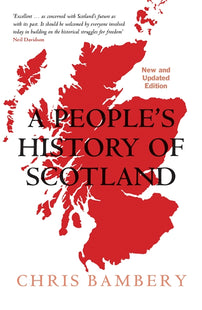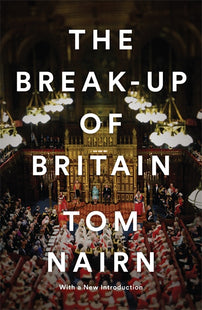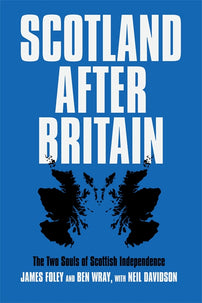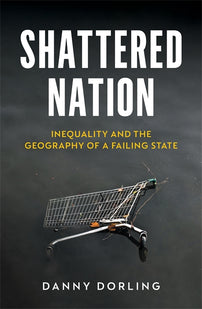Listening to The People’s History of Scotland
Launching a new history podcast, from the author of The People’s History of Scotland, Chris Bambery.

This autumn with Conter radio I am setting out this story in a series of podcasts based on the book. Each episode takes on a particular moment in history, explores what happened, the major figures involved. The podcast seeks to bring this history to life because in order to know where we are going, we must know where we come from. Join us!
*
Walk through any city centre in Scotland and you will be accosted by what the late Tom Nairn called “vulgar tartanry.” Alongside the Loch Ness Monster various figures from Scotland’s past will be on display; Mary Queen of Scots and Bonnie Prince Charlie, for example.
This is the bastard offspring of a romantic history of Scotland, largely created by the great novelist, Walter Scott. Its nationalism sits comfortably within a wider British, unionist identity. During the 19th century this degenerated into what we call the Kailyard, a sentimental presentation of an imagined small town Scotland, crafted for migrants in North America. It existed alongside pride in the Scots role in Britain’s wars, the brutal construction of Empire and a dominant Calvinism.
I grew up in the final years of this Scotland. By the 1960s, the never ending decline of Britain, economically and as a world power, began to change how Scotland saw itself.
But there is another Scotland. One whose voice was little heard until the 19th century. That is the Scotland of ordinary folk struggling to survive and often struggling for change, sometimes radical change. It is the Scotland of mass strikes, direct action, rent strikes, resistance to eviction and much more. The Scotland which produced two outstanding Marxists in John MacLean and James Connolly. “Wait a minute,” I hear you cry; Connolly was Irish. Certainly, but he grew up in Edinburgh and was won to socialism there in a city with a vibrant left, which shaped him and whether in Ireland or the USA he retained a close connection with his Scottish comrades.
[book-strip index="1"]
This is the Scotland I write about in my book, A People’s History of Scotland. Now I have recorded, along with presenter Sara Bennett and various guests, a series of podcasts looking at events and personalities I write about in the book.
Why now? Well, support for independence, largely based on a civic nationalism, has grown – there is a vocal fringe which advocates for nationalist ideas, which I reject. For instance, there is an adoption of Jacobite symbols, those who between 1688 and 1746, fought to restore the exiled Stuart monarchy, deposed by the Glorious Revolution. But most Scots, in both the lowlands and the Highlands, opposed Bonnie Prince Charlie when he led the 1745 rebellion. They did so because of his Catholicism and because he wanted to turn the clock back to create a royal absolutism allied with Bourbon France.
Earlier, it was a similar story with Mary Queen of Scots, deposed and driven into exile for the very same reasons.
*
Nine years ago, the people of Scotland voted in a referendum as to whether the country should be independent. The result was much closer than the British elite expected, having only agreed to it because they believed independence would be roundly defeated.
The campaign for a Yes vote for independence transformed into a carnival of debate, discussion and cultural ferment. Public meetings and debates, once written off as yesterday’s thing, sprung up in the smallest communities. The Radical Independence Campaign, Women for Independence and other groups pushed the whole Yes campaign left so that even the most staid Scottish National Party figures denounced the presence of Britain’s nuclear weapons on the Clyde and called for “Bairns not Bombs.” On the day of the vote itself, in Niddrie, a housing estate on the edge of Edinburgh, Yes voters marched collectively to the polling station, led by a piper.
In many ways the Independence campaign resembled the social movements which had sprung up to resist austerity, war and much more. But it also made a statement about our history.
A People’s History of Scotland first came out in the summer of 2014, concluding with a call for a Yes vote to achieve the grounds for further, radical change. But it also looked at a rich history of radicalism and revolt. The poet Robert Burns was not a harmless scribe writing of daffodils and mice but a supporter of both the American and French revolutions whose Jacobin sympathies got him into trouble with the authorities. Suffragettes, such as Helen Crawfurd, were jailed numerous times, while Agnes Dollan and Mary Barbour would play a central role in the 1915 Glasgow rent strike, one of the key episodes in Red Clydeside. John Maclean was a heroic figure who opposed the war and supported both the Bolshevik revolution in Russia and Ireland’s fight for independence. In more recent times we have seen great battles like the occupation in 1971 at Upper Clyde Shipbuilders and the mass non-payment campaign against the poll tax.
In this series of podcasts, as in the book, we look at the lives of key Scottish rebels: author and champion of the Scots language, Billy Kay, joins me to discuss Robert Burns; Kieran Allen joins me from Dublin to discuss James Connolly; Henry Bell similarly on John MacLean; Jimmy Reid’s daughter, Eileen, will join us to talk about her father who led the UCS occupation; Siobhan Tolland, an SNP councillor in Lochee, Dundee, will talk about the jute worker, unemployed activist and songwriter, Mary Brooksbank.
[book-strip index="2"]
But above all these podcasts will discuss moments when ordinary folk challenged a rapacious aristocracy and bourgeoisie. Scotland’s industrial revolution was later, shorter and more brutal than that of England’s. The new industrialists relied on labour being cheaper than south of the border and housing conditions were the worst in Britain. The Gaelic communities of the Highlands were swept away in the brutal Clearances, to be replaced by sheep and for the people to feed the demands of industry in the south of Scotland or across the Atlantic.
The aim of these podcasts is to bring alive our history, whether it’s militant suffragettes letting off bombs or hunger marchers occupying Edinburgh city centre for a week in 1933, Scot volunteers of the International Brigades in Spain, the 1971 occupation of Upper Clyde Shipbuilders and the 1988-1989 mass campaign of non-payment which broke Thatcher’s poll tax.
Culture will be central to our story. Long gone are the days of the White Heather Club with TV viewers watching, and hopefully cringing, at the offerings from the Kailyard. Today Scotland has entered modernity whether in music, fiction, poetry and much more.
Find out more here.



